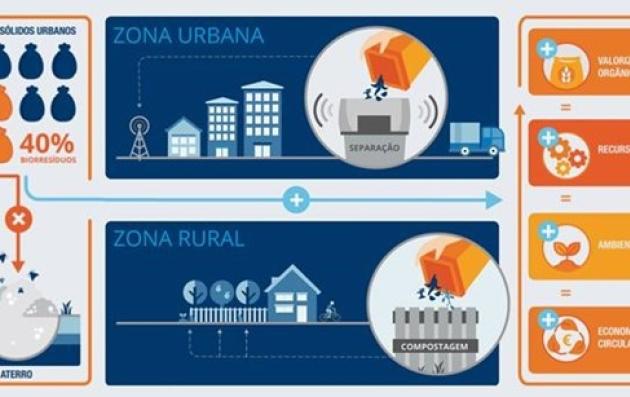Date of label : 29/10/2024
-
Viana do Castelo , Portugal
-
Size of city : 85.778 inhabitants

Flyer promoting a waste separation initiative.
Summary
The Viana Abraça project has diverted organic waste away from landfills by using it as a resource, with cost savings used in benefit of Social Solidarity Institutions of the Municipality of Viana do Castelo (PT). In urban areas, the introduction of selective collection of bio-waste using local equipment will allow for a bio-waste collection efficiency of between 50% and 72%, which is equivalent to 96 kg per household per year.
Instead of being sent to landfill, urban bio-waste is sent for recovery - composting.
The solutions offered by the Good Practice
By 31 December 2024:
In rural areas, 8,122 domestic composters were delivered, with 6,579 active composters treating 2,205 tons of biowaste at source.
In the urban area, more than 14 000 families joined the biowaste separation project.
In 2017, before the project's launch, the Municipality of Viana do Castelo sent more than 12 000 tons of biowaste for disposal in landfills with an associated cost of 276 000 euros.
The project has significantly reduced the amount of biowaste being sent to landfill, with environmental and economic benefits for the city.
Identified areas for improvement include increasing the frequency of biowaste equipment cleaning in order to reduce odours, and improver campaigns to increase adherence and quantities of biowaste collected for valorisation.
Building on the sustainable and integrated urban approach
The Viana Abraça project provides environmental, economic and social benefits.
Environmental: The project promotes efficient biowaste management, by directing it towards the production of fertilizers and energy, while reducing methane and other pollutant gas emissions due to reduction of landfill deposition.
Economic: The project promotes a circular economy by reusing biowaste as a resource. Home composting reduces the need to purchase fertilisers, while the costs related to waste management are also reduced.
Social: The project promotes education regarding waste management, and citizen involvement through domestic composting and source separation in rural and urban areas, respectively. It also benefits Social Solidarity Institutions of the Municipality of Viana do Castelo.
Based on participatory approach
The project results are published on social media, on municipality’s digital channels, and in published reports.
Key stakeholders:
Parish councils: Allow communication between authorities and citizens, especially during the project’s early stages.
Resulima S.A.: The company responsible for the treatment and valorisation of biowaste.
Private entities: Provide the necessary equipment and materials for the implementation of the project, and also provide communication (e.g. radio and newspapers).
Social Solidarity Institutions: With the implementation of Viana Abraça project, the Municipality of Viana do Castelo has been distributing saving costs from biowaste separation and diverted from landfills, to Social Solidarity Institutions, providing benefits.
Collaboration among stakeholders is essential for the success of the project, with each entity contributing with its resources and capabilities. This promotes environmental sustainability, and generates economic and social benefits for the Municipality.
What difference has it made?
The project has significantly impacted the Municipality of Viana do Castelo, by addressing environmental, economic, and social issues, and by promoting citizen involvement in mitigating climate change.
By 31 December 2024, 8 122 domestic composters had been distributed, allowing to recycle through 2 205 tons of biowaste through 6,579 active composters.
Regarding the urban area, in 2024, more than 14000 families could participate into the system for biowaste separation.
In 2017, before the project’s implementation, the Municipality of Viana do Castelo sent more than 12 000 tons of biowaste to landfills (more than 2.5 times the mass of the Gil Eannes, the former Portuguese hospital ship that is permanently moored in the Port of Viana do Castelo), resulting in costs that exceeded 276 000 euros. Therefore, the had a huge impact in the entire community.
Why this Good Practice should be transferred to other cities
The Viana Abraça project is relevant to other European cities, as it is aligned with European goals, regarding environmental sustainability and circular economy.
It promotes effective biowaste management, transforming it into useful resources like fertilizers and sources of energy. It also reduces the amount of waste sent to landfills, thereby minimising environmental impact.
Efficient waste management is essential to mitigate climate change, allowing cities to be more resilient in the face of adverse conditions. The project complies with the EU 2021-2027 political objectives, serving as an example for other cities.
The project complies with:
- The EU Waste Framework Directive.
- European Green Deal.
- The EU Circular Economy Action Plan.
- National legislation, including guidelines and targets for waste management.
It can be adjusted to suit other areas of the municipality, such as the historic city centre which lacks the selective collection of food biowaste. In this case, a door-to-door collection system could be implemented using smaller vehicles for biowaste collection.
The Viana Abraça project can be replicated in other cities looking to implement similar methodologies for biowaste separation, for its flexibility of the means used to build our project and potential to involve all citizens.
However, adjustments should be made to meet the unique characteristics and needs of each city. Economic incentives and social benefits could be significant factors for adherence.
Under the Waste Framework Directive, EU Member States are required to, selectively, collect or separate biowaste in the source by 31 December 2023. The Municipality of Viana do Castelo implemented the project before this directive was published.
